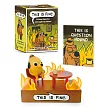This is not another "diet" book. It is a healthy eating and drinking guide. This is the book you've been looking for that will tell you what you should and should not eat - and why - without going in to a lot of scientific jargon. Carbs are not the enemy. Neither are fats or proteins. Good nutrition is more than counting calories, carbs, fats and proteins. Good nutrition is getting the nutrients your body needs for good health, abundant energy and healthy weight control. This book defines food for you.
Food Food is grown. Food is raised. Food grows in nature - in the wild. Food rots. Food has life sustaining nutrients which are imparted to you when you eat it. Food provides vitamins, minerals, enzymes, micronutrients, macronutrients, phytonutrients, antioxidants and fiber. Food is not made. Food is not manufactured. This book will tell you what is and is not food. It will show you how to look for chemical additives and hidden sweets. It will show you marketing tricks used by manufacturers to make you think you're getting healthy, real food. It will help you arm yourself against the onslaught of ads and false claims. Nature did not complicate food People are so confused about what they should or should not eat. It's not your fault Nature did not complicate food for us. Humans have complicated our eating and drinking by manufacturing non-foods and marketing them in mammoth campaigns as food. The past two generations have grown up with grocery stores filled with boxes and bags of manufactured or over processed "food" devoid of natural nutrients. Most of what is passed off to us in grocery stores and advertised in print or TV commercials has relatively few natural nutrients and bears little resemblance to what nature provided for us to nourish our bodies. It may have once been a natural, living food, but in its current form exhibits few original characteristics. Young Americans are craving information about healthy eating the way your body craves nutrient-providing food after being left unfulfilled from all the refined "food" you give it. High school newspapers run series of articles on the various diets and diet plans student's friends and teachers follow. They are ravenous for advice and will take it from any and every source - creating even more desperation as the conflicting information causes further confusion. Never before has timing been so critical I can't just sit back and read another article in the daily paper - such as "Young People seek ways to lose weight; improve their lives" or "Obesity will cut U. S. Life Expectancy" - without doing all I can to help. Go to the book stores. There are entire sections on diet and nutrition books. Some are written by doctors - even doctors of psychology. Some are written by actors, entertainers and other individuals who want to share their own success stories. Some are written by prestigious university nutrition departments - usually sponsored by food or drug companies. They all tell a different story, but don't emphasize the importance of eating whole, natural "real", food rather than counting calories, carbs, fat or protein. With this book, there is no need for carrying around a food diary or pocket carb counter.


 天天爆殺
天天爆殺  今日66折
今日66折 




























 博客來
博客來 博客來
博客來 博客來
博客來 博客來
博客來 博客來
博客來